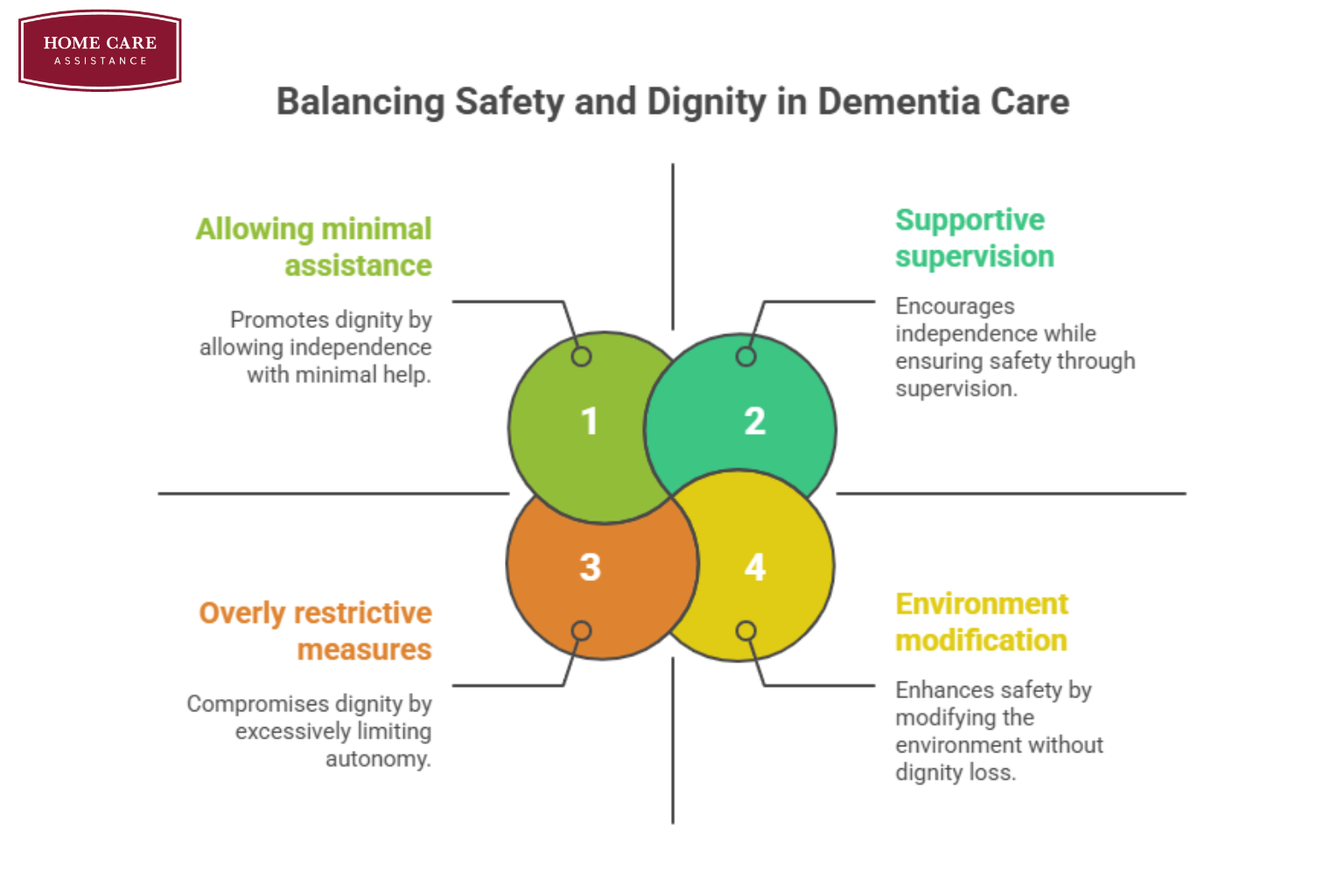
Table of Content
When it comes to caring for individuals with dementia, the balancing act between preserving their dignity and ensuring their safety can be complex. Caregivers often face tough decisions that require empathy, patience, and careful planning. This blog explores key considerations and strategies for navigating this delicate balance.
Understand the Importance of Dignity in Dementia Care
Dignity is a fundamental human right. For individuals with dementia, maintaining a sense of dignity means feeling valued and respected even as cognitive abilities decline. When caregivers prioritize dignity, they provide opportunities for their loved ones to make choices, maintain independence, and engage in meaningful activities.
Examples of promoting dignity in dementia care:
- Allowing your loved one to dress, eat, or groom with minimal assistance if he or she is able
- Speaking to your loved one directly and respectfully rather than over him or her or in a patronizing tone
- Including your loved one in discussions about his or her care plan whenever possible
Acknowledging your loved one’s preferences and treating him or her as an individual upholds his or her sense of identity and self-worth.

Ensure Safety without Sacrificing Autonomy
While safety is a primary concern, overly restrictive measures can sometimes lead to feelings of frustration or disempowerment in those with dementia. Striking a balance involves assessing risks without completely removing autonomy.
Strategies to maintain safety while respecting independence:
- Environment modification – Install grab bars, remove trip hazards, and provide proper lighting in areas your loved one frequently uses.
- Monitoring systems – If your loved one is prone to wandering, use GPS trackers or medical alert devices rather than limiting his or her movements entirely.
- Supportive supervision – Encourage supervised activities instead of focusing on what’s off-limits.
These precautions allow your loved one to retain a sense of freedom while still addressing potential risks.
Caring for a loved one with dementia can be challenging, but compassionate help is available. If your senior loved one has been diagnosed with a serious condition and needs help with tasks like meal prep, transportation, bathing, and grooming, reach out to Home Care Assistance, a leading provider of home care families can trust. We also offer comprehensive care for seniors with dementia, Alzheimer’s, and Parkinson’s.
The Role of Families and Caregivers in Decision-Making
Families and caregivers play a pivotal role in making decisions that honor both safety and dignity. However, communication and collaboration are key when determining the best course of action.
Key considerations for families and caregivers:
- Open dialogue – Discuss care preferences early on to understand your loved one’s wishes before cognitive decline advances.
- Regular assessment – Continually evaluate your loved one’s abilities and adjust decisions to his or her current needs and capabilities.
- Professional advice – Collaborate with healthcare providers, therapists, or dementia care specialists for guidance on managing complex decisions.
A collaborative approach ensures decisions are made with empathy and thoughtfulness.
Address Behavioral Challenges with Compassion
Behavioral changes in individuals with dementia, such as aggression, confusion, or wandering, can pose safety risks. Approaching these behaviors with compassion rather than frustration can prevent unnecessary distress.
Compassionate approaches include:
- Identifying triggers – Recognize environmental factors or unmet needs that may be causing the behavior.
- Adapting responses – Reassure and redirect rather than correcting or arguing with your loved one.
- Trying nonpharmacological interventions – Use music, therapy pets, or other calming strategies as alternatives to medication.
This approach not only enhances safety but also fosters an environment of dignity and respect.
Highly trained caregivers with experience in caring for seniors with dementia can be a fantastic resource for family members. Families looking for top-rated Philadelphia in-home care providers can reach out to Home Care Assistance. From respite care to specialized Alzheimer’s, dementia, stroke, and Parkinson’s care, there are many ways we can make life easier for seniors and their loved ones.
Balance Your Own Emotional Wellbeing
Caregivers often bear a significant emotional burden when navigating decisions for individuals with dementia. Ensuring your emotional wellbeing is equally important to providing balanced care.
Tips for caregivers:
- Join support groups to share experiences and learn from others facing similar challenges.
- Take breaks and prioritize self-care to avoid burnout.
- Access professional counseling if feelings of guilt or stress become overwhelming.
Your ability to provide care depends on their own emotional resilience, making self-care an essential component of dignified and safe dementia care.
Even when families have the best intentions, caring for a senior loved one with dementia can be challenging. Fortunately, Home Care Assistance is here to help. We are a leading provider of dementia care. Philadelphia families can take advantage of our flexible and customizable care plans, and our caregivers always stay up to date on the latest developments in senior care. Call Home Care Assistance today at (215) 645-4663 to learn about our high-quality in-home care services.